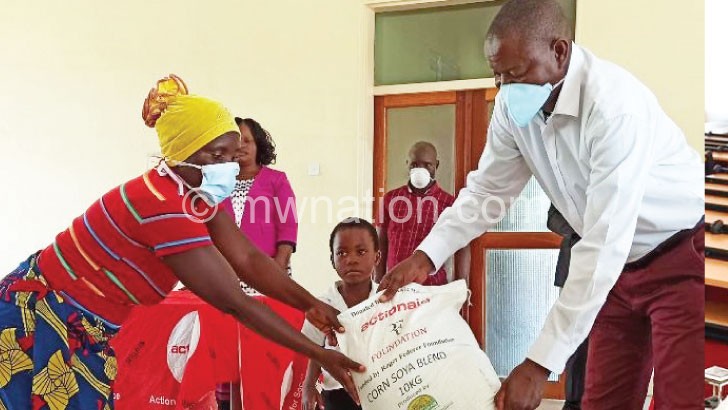A firm start in tricky times
Edith Kachoka, 32, only has good words for Mwangata Community Based Childcare Centre (CCBC) in Traditional Authority Kawinga in Machinga,
The mother-of-four credits the centre with giving her children a solid start in life.
“Seven years ago, I sent my child to the childcare centre and that gave him a strong foundation. Now in Standard Five, he is always top of the class because of the solid beginning he got,” she says.
Kachoka advises parents to send children to the early childhood development (ECD) centres seen across the country.
“The CBCCs offer children a chance to bond and know vital things at an early stage before joining primary schools,” she says.

The children at Mwangata CBCC receive porridge every morning before they start singing songs, reciting poems, playing and listening to folktales.
This improves the well-being of children who cannot afford three nutritious meals a day.
With schools closed to safeguard children from the coronavirus disease (Covid-19) discovered in China last year, Kachoka’s worry is what happens to her young daughter.
“My child is stuck at home and I have to look after her. When I think of the services she used to get at the childcare centre, she may forget everything she learned,” she laments.
To mitigate the impact of the worldwide Covid-19 outbreak, ActionAid Malawi is distributing soya flour to needy households for the benefit of children struggling with hunger, malnutrition and poverty.
Plans are also underway to start offering radio lessons in aid of children who have to do with home schooling to prevent the coronavirus spread.
Kachoka says the lessons to be delivered via radio receivers, a widely accessible source of information in rural areas where 84 in 100 Malawians live, will be handy for poor households who cannot afford computers for online learning which has become trendy in urban localities.
On the porridge part, she also thanked the organisation for coming up with measures that will see children remain healthy by providing them with soya blend flour (Likuni Phala) in their homes since the centres are closed.
She says: “Other parents will be encouraged to send their children to CBCCs when schools reopen because they would want their children to benefit in future.”
According to ActionAid executive director Hassan Golowa, all children need to be protected and supported whether they are learning at home or at school.
“As future leaders, they need our support regardless of where they are. The schools are closed, but what happens to their wellbeing remains our responsibility. We need to continue to provide for them.
“ActionAid will always put children first and ensure they get the best foundation when it comes to their right to education.”
Paramount Chief Kawinga of Machinga says the nutritional support and recorded lessons will help reduce inequalities faced by children from rural background.
He calls it inclusive, saying every child needs to feel loved regardless of where they live and their economic status.
“They will feel valued as they will continue to learn in the comfort of their homes as they were doing at the childcare centre. The nation needs to put in place inclusive measures when we are stranded as a nation. Let us think of everyone so that no one is left behind in the implementation of various programs,” he explains.
Poverty remains a major setback to access to quality early childhood development, the national policy on integrated early childhood development indicates.
It shows that approximately 15 percent of Malawians are extremely poor, making it difficult for most households to provide accessible and quality ECD services.
The assistance from non-governmental organisations such as ActionAid helps give disadvantaged children a shot at lifelong learning in line with national and global sustainable development goals.
Studies show children with quality ECD tend to perform better and stay longer in school than those denied this foundation in the first eight years.
Archie Malista, executive director of the Association of ECD in Malawi, says the support from non-governmental organisation motivates the association (NGOs) to keep investing in constrained CBCCs and children.
“We cannot deny the fact that we need support, whether during normal times or amid crises. ECD centres still need the support they can get from government and NGOs for our children to develop well,” he says.





